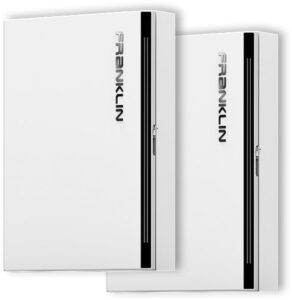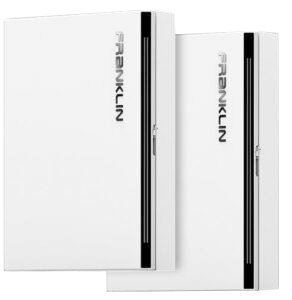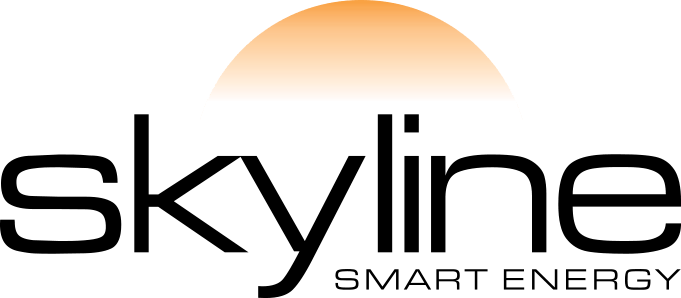What Is A FranklinWH Battery Backup?
FranklinWH battery backup systems store any unused power from your solar panels for later use. When you experience an outage, you can leverage the stored power in your battery to keep portions of your home running. Keep reading to learn more about the benefits of investing in a FranklinWH battery backup with your solar panel system.
Benefits Of A FranklinWh Battery Backup System
FranklinWH batteries offer cutting-edge solutions to common issues, such as power outages. Here are some of the ways a battery backup can impact your home:
How Does A FranklinWH Battery Backup Work?

WHAT IT DOES
With a battery backup, you can store unused power generated by your solar panels for later use, such as during a power outage, or at night, when your panels aren’t producing.
HOW IT WORKS
Typically, solar panels can only power your home when you’re connected to the grid. By storing excess solar energy inside your battery, you can power a portion of your home independently from the grid.
WHAT IT MATTERS
Bundling a FranklinWH battery backup with your solar panel system helps your solar energy go further for your home’s energy needs.
Solar Battery and Power Outages
Poor weather conditions, construction and more can impact the electric grid. A backup power source can offer you the opportunity to keep your home’s essentials running during an outage. Even in the winter months or during times of low solar production, a battery backup can help your system provide solar power to your home.
Learn More About Your Solar Battery Modes
The FranklinWH battery backup offers four storage modes, allowing you to manage your supply of solar power for use overnight or during grid failure
Self-Supply Mode
Send excess solar output from your solar panels directly to the FranklinWH battery. When the battery reaches full capacity, additional solar power is sent back to the grid.
Clean Backup Mode
Instead of using solar energy for your home’s day-to-day power needs, it first sends the solar electricity your system produces directly to your backup battery to keep it at full capacity.
Priority Backup Mode
Supplement your stored solar electricity with grid power in order to keep a full supply of electricity in your FranklinWH battery.
Grid Mode
Use grid power to keep your battery at full capacity. This may be the right option if your backup battery is not connected to your solar panel system.
FranklinWH Warranty
Protect your solar investment with the FranklinWH warranty, designed to ensure your battery backup is free of product and workmanship defects.

Frequently Asked Questions
The number of solar panels you need will depend on many different factors. These include your roof’s sun exposure, your current energy consumption, your goal electric bill and your home appliances. Ultimately, the exact amount of solar panels your home may need to see potential savings is unique to you. Our team will walk through each of these factors and determine the ideal number of panels needed to meet your energy goals.
Solar panel costs typically depend on the style and number of panels you select, current electricity costs in your area, and whether or not you qualify for any local rebates and incentives. Installation costs also factor in. However, depending on your panel efficiency, your region’s sunlight exposure, your home’s current energy usage, etc, you could potentially offset the cost of your system over the lifespan of your investment. Our system engineers will take all of these details into consideration to design a solar system that’s totally custom for your home.
Your potential savings depend on a variety of factors, including where you live and how much energy your home currently consumes. Local utility rates, solar incentives, net metering policies and more can also impact your savings potential.
To make your solar journey as seamless as possible, Skyline Smart Energy offers $0 down, 100% financing on solar systems for qualified homeowners. Learn more about going solar for less.
Homeowners installing solar panels before the end of 2023 can potentially deduct up to 30% of the cost of their solar installation from their federal taxes. Learn how to take advantage of this solar tax incentive before its expiration.
While some locations may receive more direct sunlight than others, our high-performance solar panels need only be clear of debris to produce electricity for your home, regardless of where you live.
While performance issues and early wear and tear of your panels are highly unlikely, you can protect your solar investment and keep your system producing for many years to come with our generous warranty options.
Net metering gives you a way to store energy and use it when you need it. During peak sunlight hours, the average solar panel system produces more power than you and your family can use. The extra energy is fed back into the grid, and the utility can use it for someone else. You get credit for the energy you feed back into the grid. When needed, you can use that credit to get power from the grid during the night, or on cloudy days when your home needs more energy than your panels are generating. Net metering improves the economics of solar power significantly, and it’s why Skyline Smart Energy works with power companies that provide it.
For those utility companies that don’t offer net metering, installing a battery is a way to utilize more of the energy your solar panels generate to your benefit.
How quickly you can pay off your solar panel system depends on several factors including federal and state tax incentives you may be eligible for, whether you choose to pay off extra each month, and the size of your particular solar project.
The short answer is, yes, solar panels are worth the cost. Solar panels could potentially lower your electric bills, you take steps towards owning your power (not renting it), you can offset future utility bills with net metering, and home solar panels could potentially raise the value of your property.
See If You Qualify To Go Solar Today
It’s never been easier to go solar.
Contact us for a FREE evaluation today.
- $0 Down Payment
- Up To 25 Year Performance Warranty
